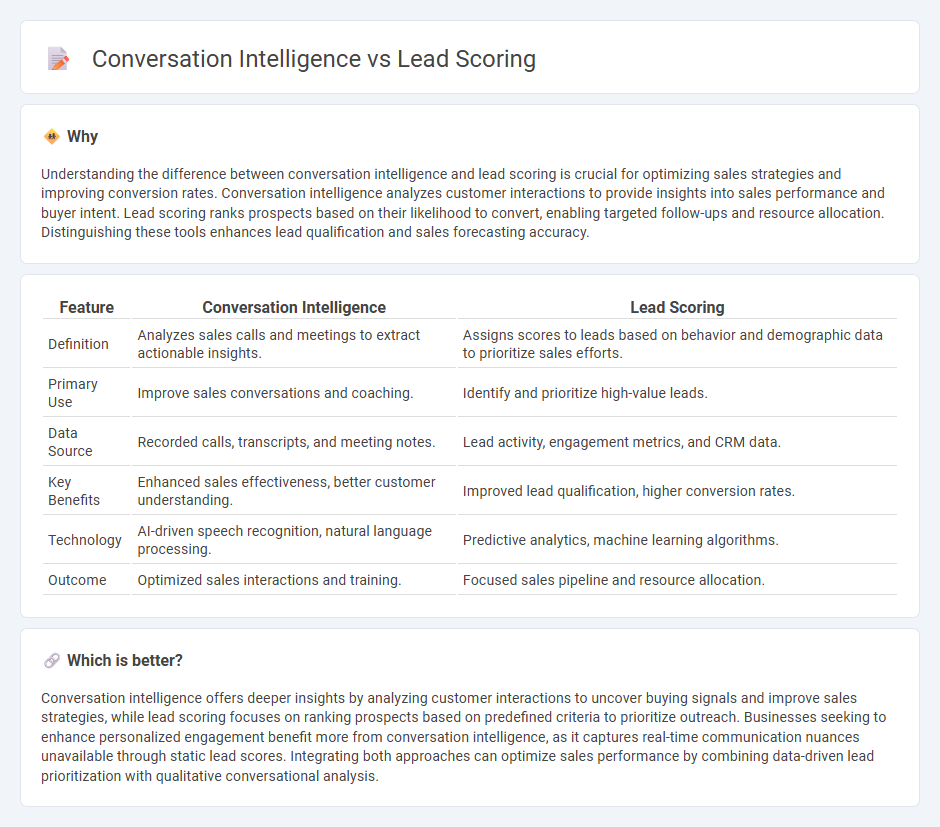
Conversation intelligence leverages AI to analyze sales calls and uncover customer insights, enhancing communication strategies and closing rates. Lead scoring uses data-driven algorithms to rank prospects based on their likelihood to convert, optimizing sales focus and resource allocation. Explore how integrating conversation intelligence with lead scoring can transform your sales performance.
Why it is important
Understanding the difference between conversation intelligence and lead scoring is crucial for optimizing sales strategies and improving conversion rates. Conversation intelligence analyzes customer interactions to provide insights into sales performance and buyer intent. Lead scoring ranks prospects based on their likelihood to convert, enabling targeted follow-ups and resource allocation. Distinguishing these tools enhances lead qualification and sales forecasting accuracy.
Comparison Table
| Feature | Conversation Intelligence | Lead Scoring |
|---|---|---|
| Definition | Analyzes sales calls and meetings to extract actionable insights. | Assigns scores to leads based on behavior and demographic data to prioritize sales efforts. |
| Primary Use | Improve sales conversations and coaching. | Identify and prioritize high-value leads. |
| Data Source | Recorded calls, transcripts, and meeting notes. | Lead activity, engagement metrics, and CRM data. |
| Key Benefits | Enhanced sales effectiveness, better customer understanding. | Improved lead qualification, higher conversion rates. |
| Technology | AI-driven speech recognition, natural language processing. | Predictive analytics, machine learning algorithms. |
| Outcome | Optimized sales interactions and training. | Focused sales pipeline and resource allocation. |
Which is better?
Conversation intelligence offers deeper insights by analyzing customer interactions to uncover buying signals and improve sales strategies, while lead scoring focuses on ranking prospects based on predefined criteria to prioritize outreach. Businesses seeking to enhance personalized engagement benefit more from conversation intelligence, as it captures real-time communication nuances unavailable through static lead scores. Integrating both approaches can optimize sales performance by combining data-driven lead prioritization with qualitative conversational analysis.
Connection
Conversation intelligence analyzes customer interactions to extract valuable insights, enhancing the accuracy of lead scoring models by identifying high-potential prospects. By leveraging speech analytics and sentiment analysis, sales teams can prioritize leads based on engagement quality and buying signals. Integrating these technologies streamlines the sales funnel, improving conversion rates and maximizing revenue growth.
Key Terms
**Lead Scoring:**
Lead scoring quantifies the potential value of leads by assigning scores based on demographic data, behavioral patterns, and engagement levels, enabling sales teams to prioritize prospects effectively. It integrates CRM data and predictive analytics to forecast conversion likelihood and optimize resource allocation. Discover how lead scoring drives sales efficiency and revenue growth.
Qualification Criteria
Lead scoring quantifies prospects by assigning values based on demographics, behavior, and engagement, prioritizing leads with the highest potential to convert. Conversation intelligence analyzes sales interactions to extract insights on customer needs, objections, and buying signals, enhancing the qualification process through qualitative data. Discover how combining lead scoring with conversation intelligence can optimize your qualification criteria for better sales outcomes.
Scoring Model
Lead scoring utilizes predictive algorithms and behavioral data to rank prospects based on their likelihood to convert, emphasizing metrics such as engagement frequency, demographic fit, and purchasing signals. Conversation intelligence analyzes sales calls and interactions to extract actionable insights, identifying key buying signals and objection patterns, which can enhance the accuracy of lead scoring models. Explore how integrating conversation intelligence with lead scoring can refine your sales strategy and improve conversion rates.
Source and External Links
What Is Lead Scoring? Definition, Models, Best Practices - Cognism - Lead scoring is a method that assigns points to leads based on attributes and behaviors to prioritize those most likely to convert, reducing guesswork and increasing sales efficiency.
Lead scoring - Wikipedia - Lead scoring ranks prospects by perceived value using explicit data (like job title) and implicit behavior (like website visits), improving sales prioritization, marketing effectiveness, and revenue growth.
The Ultimate Guide to Lead Scoring - ActiveCampaign - Effective lead scoring involves defining minimum customer criteria and target market characteristics to create a balanced system that prioritizes leads based on fit and behavior.
 dowidth.com
dowidth.com